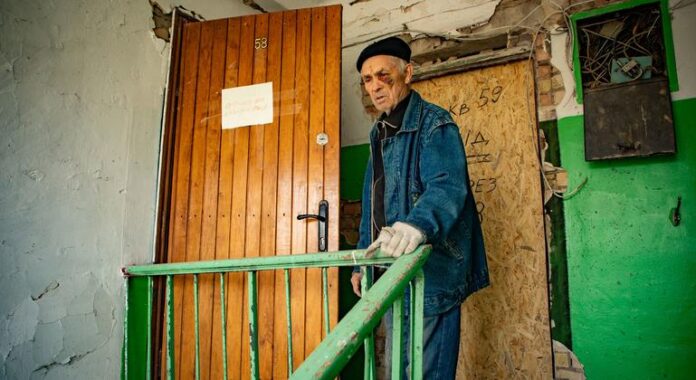President of the European Council António Costa presented the main results of the discussions of the leaders during the EU-Egypt summit held in Brussels on 22 October 2025.
Green light for Gang Suppression Force tells Haitians “they are not alone,” Security Council says
Speaking to ambassadors for the first time as head of the UN office in Haiti (BINUH), Carlos Ruiz Massieu addressed the persistent gang violence and humanitarian crisis in the country, the political transition expected to take place next year and attempted to restore national security through the recently agreed agreements. Gang Suppression Force (GSF).
“Disastrous” circumstances
“There is no doubt that the circumstances are dire, but the Haitian people have not given up“, declared Mr. Massieu, who met with multiple political, international and civil actors in the country over the last two and a half months.
As armed groups increasingly target farming communities on the outskirts of the capital and other areas, he stressed that the scale and impact of internal displacement is “unprecedented,” amounting to more than 1.4 million displaced people.
“The human rights situation also remains very worrying, with widespread abuses linked to gang attacks, violence involving self-defense groups and even some security operations,” he added.
Political transition in progress
“I am concerned that a stable path towards the restoration of democratic governance has not yet been charted,” Massieu said of the transfer of power to elected officials expected to take place by February 7 next year.
He welcomed the actions of Haitian authorities to consult political representatives regarding the elections in order to avoid a political vacuum beyond February, noting that “Sustained inter-Haitian dialogue remains crucial to forging a renewed consensus on the way forward.”
BINUH will provide technical and logistical support ahead of the elections, he said.
UN agencies are distributing humanitarian aid in Bassin Bleu, Haiti, which was attacked by gangs in September.
A new strength, a sign of comfort
Mr. Massieu welcomed Security Council-supported the Gang Suppression Force and encouraged the authorities to take appropriate measures to strengthen security and ensure the protection of communities most affected by violence, particularly children.
He warned that the hostile security environment continues to affect Haiti’s international partners in the capital, but that he is leading BINUH’s efforts to achieve “100 percent staff presence in the capital as a matter of urgency.”
“The recent action of this Council was a signal to reassure the Haitian people that they are not alone – that the international community stands with them during this critical moment,” he said.
“Now is the time to quickly translate this signal into real progress and turn the tide of violence..”
For complete coverage of the event, check out our live page.
Originally published at Almouwatin.com
Russian strikes on Ukraine kill at least six civilians, injure dozens
“At least six civilians were killed, including two children, and more than 30 people injured” due to missile and drone attacks, the United Nations Human Rights Monitoring Mission in Ukraine (HRMM) said in a post on social media.
Observers said they visited a kindergarten that was badly damaged in drone strikes in the eastern city of Kharkiv – near the Russian border – and noted that all 50 children had been safely evacuated.
“Serious danger”
“This incident demonstrates ongoing attacks using long-range weapons that target residential areas, including educational institutions, putting the civilian population in grave danger,” HRMM posted on X.
Ukraine’s Energy Ministry said the attacks damaged infrastructure across the country, causing emergency power outages in many regions. Electricity and water supplies were disrupted, while national rail services faced delays due to damaged lines.
As the UN and its partners continue to provide aid to war-weary communities on the ground, OCHA reiterated a crucial message: civilians should never be targets.
Frontline help
U.N. deputy spokesperson Farhan Haq told correspondents in New York on Wednesday that an inter-agency humanitarian convoy had managed to reach Urozhaine, a frontline community regularly hit by bombings and drone attacks.
“We, with our partners, delivered 11 tonnes of aid to some 1,000 residents, including food, hygiene and dignity kits, warm blankets, solar lamps and medical supplies,” he stressed.
“This was the 24th humanitarian convoy to hard-hit areas of the Kherson region this year.”
Although operations continue, UN humanitarians face growing challenges following the incident on Tuesday last week in which a convoy of four UN humanitarian trucks was attacked by Russian forces, a stark reminder of the risks faced by those providing vital aid on the front lines.
“Of course it is shocking,” Ukraine’s top aid coordinator, Andrea de Domenico, told UN News on Tuesday, noting that it was the first direct attack on a humanitarian convoy.
“After this happened, I told the team that this was one of the risks we had to face. Our UN security colleagues worked excellently with us and were very effective in protecting the lives of those involved in this mission.
“It takes a lot of determination, courage and motivation to keep doing it, but that’s what being involved in humanitarian operations in a war zone is all about. »
Originally published at Almouwatin.com
Security Council LIVE: UN discusses next phase to reduce Haiti’s gang violence and scale up aid
Following the renewal of the Security Council sanctions regime in Haiti and a resolution to create a new Gang Suppression Force to combat the scourge of gang violence, ambassadors heard from the country’s top UN official this afternoon. In his first briefing as head of the United Nations office in Haiti (BINUH), Carlos Ruiz Massieu reported on the latest developments, as brutal violence and insecurity continue to rage, increasing pressure on diplomats to act quickly and decisively to protect millions of Haitians facing impunity and chaos. UN News app users can follow live blanket here.
Originally published at Almouwatin.com
Four winters on, UN in Ukraine continues to deliver aid under fire
From providing emergency care and evacuation support, to repairing bombed energy plants, UN humanitarian workers are delivering despite reduced resources, an expanding frontline and direct attacks on their colleagues.
The widespread use of drones and glide bombs in the Ukraine war means that a large swath of the country is directly exposed to Russian strikes, further complicating the work of the UN Office for the Coordination of Humanitarian Affairs (OCHA), which is preparing for the famously harsh Ukrainian winter.
UN News spoke to Andrea de Domenico, OCHA’s Ukraine country chief, about the challenges he and his colleagues are dealing and how they cope with working under fire.
Andrea de Domenico: Our resources are shrinking, so we have to make tough choices. We have identified some specific priorities, such as frontline response, evacuation support, and humanitarian aid for displaced people.
We’re focused this year primarily on those living along the frontline, most of whom are vulnerable, elderly people with limited mobility who need support.
On top of that, we have to respond to attacks on energy infrastructure, which is a big challenge. In the last week, for example, 60 percent of gas production has been damaged. If you take away water and electricity, surviving winter will be very, very difficult.
With support from the centre in Chișinău, Moldova, an elderly Ukrainian is learning new ways to navigate the challenges of displacement.
UN News: How much do you need to help those in need, and how much have you received?
Specifically for winter we have asked for $277 million and roughly 50 per cent of that has been mobilized, so there is still a long way to go in order to hit the overall target.
Unfortunately, if we don’t reach that figure it means that people will not be able to spend winter in their homes and will have to be evacuated.
UN News: Last week a UN convoy was shelled. How does your team cope with the psychological pressure of working in such conditions?
The vast majority of humanitarian assistance on the frontline is provided by local authorities and local partners, and we should recognise the fantastic work that they do day in, day out.
They have been exposed to these types of attacks over and over again. This year alone, we have recorded more than 100 incidents.
There have been attacks in which we were collateral damage, but this is the first direct attack on a United Nations humanitarian convoy. Of course, it’s shocking.
After it happened, I said to the team that this is one of the risks that we have to deal with. Our UN security colleagues worked excellently with us and were very effective in protecting the life of those involved in that mission.
It takes a lot of determination, courage and motivation to keep on doing it, but that’s what it is, to be involved in humanitarian operations in a war zone.
Israel obliged to let aid flow into occupied Palestinian territory, says World Court
In a detailed advisory opinion requested by the General Assembly, the highest court of the UN considered that Israel is obliged to “ensure that the population of the occupied Palestinian territory [OPT] has the essential supplies for daily living, including food, water, clothing, bedding, shelter, fuel, medical supplies and services.»
The court called on Israel to also “respect and protect” all humanitarian workers, medical personnel and facilities.
By ten votes to one, the judges also found that Israel “has an obligation” to cooperate in good faith with the UN, “providing it with all assistance in any action it undertakes in accordance with the Charter of the United Nations”, including the aid agency for Palestinian refugees, UNRWA.
UN Secretary-General António Guterres describes the ICJ this opinion is “very important”, adding that it comes at a time when the UN is doing everything it can to increase aid to Gaza after the ceasefire.
The opinion – request in December 2024 – addresses Israel’s obligations in its relations with the UN and other international organizations and countries involved in humanitarian operations in Palestine.
In a sign of the level of international engagement in this matter, 45 states and organizations filed written statements and 39 presented oral arguments during the hearings held from April 28 to May 2, 2025.
Why the court is important
The ICJ, based in The Hague, is the principal judicial organ of the United Nations.
He settles legal disputes between States and gives advisory opinions at the request of UN bodies.
These opinions are not legally binding, but they carry significant moral and legal authority and often guide international policy and practice.
Bound by international law
The ICJ detained that Israel is bound by international humanitarian law and human rights law to respect and protect civilians in the OPT, ensuring that humanitarian workers and medical facilities are protected and that no civilians are forcibly transferred or deprived of food.
Ten of the eleven judges agreed that Israel must respect the privileges and immunities of the UN and its officials, in accordance with the United Nations Charter. This includes the “inviolability” of all UN premises – including those managed by UNRWA.
Ugandan Vice President Julia Sebutinde cast the lone dissenting voice in several sections.
The ICJ also reaffirmed Israel’s obligation to allow the International Committee of the Red Cross (ICRC) access to detainees in the OPT and to “respect the prohibition on resorting to starvation of civilians as a method of warfare.»
Israel’s Foreign Ministry said in a social media post that it “categorically rejects” the ICJ’s advisory opinion, describing it as “another political attempt to impose political measures against Israel.”
Originally published at Almouwatin.com
Most major methane leak warnings ignored despite climate threat
Methane is a powerful greenhouse gas with a warming potential 80 times that of carbon dioxide over a 20-year period.
Reducing emissions would bring rapid and tangible climate benefits, according to the United Nations Environment Program (UNEP), arguing that cutting human-caused emissions by about half is one of the most cost-effective ways to slow climate change in the short term.
In 2022, UNEP launched a satellite tracking system to detect unintentional methane leaks from the oil and gas sectors.
“Bending the curve” on emissions
Known as MARS (Methane Alert and Response System), it provides free, accurate information on emissions – which are odorless, invisible and therefore difficult to spot – so that companies and national authorities can act accordingly.
According to the latest edition of UNEP International Methane Observatory publication released Wednesday, the number of alerts resulting in action increased from 1 to 12 percent over the past year.
The agency says more action is needed to meet the goal of reducing methane emissions by a third by 2030.
“Reducing methane emissions can quickly reverse the curve of global warming, buying more time for long-term decarbonization efforts.“, says Inger Andersen, director of UNEP: “But significant progress in reporting must translate into emissions reductions.”
A firm response
Ms Anderson urged all businesses in the sector to join the Oil and gas methane 2.0 partnershipthe global standard for measuring and mitigating methane emissions in the oil and gas sector, which is fundamental to regulating the world’s largest oil and gas purchasing market – the European Union.
The MARS system is now being extended to cover methane emissions from coal mines and landfills – where measurements have until now been rare – and UNEP is stepping up detection of emissions from the steel industry, which still relies mainly on coal.
In its report, the UN agency notes that low-cost solutions to methane emissions from coal used in steelmaking are available but remain largely overlooked in efforts to decarbonize the industry.
Originally published at Almouwatin.com
Four winters later, UN in Ukraine continues to provide aid under fire
From providing emergency care and evacuation assistance to repairing bombed energy plants, UN aid workers are carrying out their tasks despite reduced resources, an expanding front line and direct attacks on their colleagues.
The widespread use of drones and hover bombs in Ukraine’s war means that much of the country is directly exposed to Russian strikes, further complicating the work of the United Nations Office for the Coordination of Humanitarian Affairs (OCHA), which is preparing for the famous harsh Ukrainian winter.
UN News spoke with Andrea de Domenico, OCHA Country Head in Ukraine, about the challenges he and his colleagues face and how they cope with their work under fire.
Andrea de Domenico: Our resources are dwindling, so we must make difficult choices. We have identified some specific priorities, such as frontline response, evacuation assistance and humanitarian aid to displaced people.
This year we are focusing primarily on people living on the frontline, most of whom are vulnerable older people with limited mobility who need support.
Additionally, we need to respond to attacks on energy infrastructure, which poses a significant challenge. Last week, for example, 60 percent of gas production was damaged. If you remove water and electricity, surviving the winter will be very, very difficult.
With support from the center in Chișinău, Moldova, an elderly Ukrainian learns new ways to cope with the challenges of displacement.
UN News: How much do you need to help those in need, and how much have you received?
Specifically for winter, we requested $277 million and about 50 percent of that has been mobilized. There is therefore still a long way to go to achieve the overall goal.
Unfortunately, if we don’t reach this figure, it means that people will not be able to spend the winter in their homes and will have to be evacuated.
UN News: Last week, a UN convoy was bombed. How does your team cope with the psychological pressure of working in such conditions?
The vast majority of frontline humanitarian aid is provided by local authorities and local partners, and we must recognize the fantastic work they do day in and day out.
They have been repeatedly exposed to these types of attacks. This year alone we have recorded over 100 incidents.
There have been attacks in which we have been collateral damage, but this is the first direct attack on a United Nations humanitarian convoy. Of course it’s shocking.
After this happened, I told the team that this was one of the risks we had to face. Our UN security colleagues worked excellently with us and were very effective in protecting the lives of those involved in this mission.
It takes a lot of determination, courage and motivation to keep doing it, but that’s what being involved in humanitarian operations in a war zone is all about.
Originally published at Almouwatin.com
New forum builds on Seville commitments to tackle global debt crisis
The Seville Debt Forum will promote fairer lending, faster restructuring and long-term reform of the post-war financial system.
Hosted by Spain and supported by the United Nations, the forum is designed to maintain global attention on the debt crisis while delivering on strong commitments made at the June summit Fourth International Conference on Financing for Development (FFD4) in Seville in concrete actions.
Governments, finance ministers and creditors from developed and developing countries will unite for what the UN Secretary-General calls “a global debt dialogue” – a dialogue that aims to achieve financial justice and ensure that borrowing benefits, not against, developing economies.
“Developing countries spend $1.4 trillion a year on debt servicing.» said António Guterres at the launch in Geneva.
“And 3.4 billion people live in countries that spend more on debt servicing than on health or education. Countries should never have to choose between servicing their debt or serving their people.»
3.4 billion people live in countries that spend more on interest than on health or education.
Commitment to action
The new forum will also support the Seville commitmentan ambitious roadmap agreed at the FFD4 conference to make global finance fairer and more sustainable.
This document sets out plans to reduce borrowing costs, enable rapid and fair debt restructuring and increase transparency and accountability.
He also established a borrowers forumlaunched in Seville in July, to help struggling countries coordinate their efforts, share legal and technical expertise and amplify their voice in a system long dominated by big lenders.
Serve the people
The Seville Process – including both Commitment and the Action Platform – reflects growing concern that skyrocketing debt is derailing progress toward Sustainable Development Goals (SDG).
More than 60 developing countries now spend at least 10 percent of their public revenue on interest payments.while many face decreasing access to affordable credit.
Under this new framework, countries will work to develop common principles for responsible borrowing and lending, strengthen crisis prevention mechanisms, and explore reform of the global debt architecture – long considered outdated and fragmented.
“The Seville Debt Forum help ensure the financial justice that citizens and countries need and deserve“, said Mr. Guterres. “The United Nations is proud to participate in this effort, and I thank Minister [Carlos] Cuerpo and the Spanish government for their tireless efforts.
Originally published at Almouwatin.com
Climate science and early warnings are essential to saving lives
“Early warning systems work,” he told the World Meteorological Organization (WMO) in Geneva. “They give farmers the power to protect their crops and livestock. Allow families to evacuate safely. And protect entire communities from devastation.”
“We know that disaster-related mortality is at least six times lower in countries with good early warning systems,” the UN chief said.
He added that just 24 hours’ notice before a hazardous event can reduce damage by up to 30 percent.
In 2022, Mr. Guterres launched the Early warnings for everyone initiative to ensure that “everyone, everywhere” is protected by a warning system by 2027.
Progress has been made: more than half of countries are now equipped with multi-risk early warning systems. The world’s least developed countries have almost doubled their capacity since official reporting began, “but we have a long way to go,” the UN chief acknowledged.
At a special meeting of the World Meteorological Congress earlier this week, countries endorsed an urgent call for action to close remaining monitoring gaps.
Extreme weather conditions worsen
WMO Director Celeste Saulo, who has called for increased adoption of early warning systems, warned that the impacts of climate change are accelerating as “more extreme weather destroys lives and livelihoods and erodes hard-won development gains.”
She spoke of a “profound opportunity to harness climate intelligence and technological advances to build a more resilient future for all.”
Weather, water and climate hazards have killed more than two million people over the past five decades, with developing countries responsible for 90 percent of deaths, according to the WMO.
Mr. Guterres stressed that for countries to “act at the speed and scale required,” increased funding will be essential.
Increased funding
“Reaching every community requires increased funding,” he said. “But too many developing countries are stuck with limited fiscal space, slowing growth, crushing debt burdens and growing systemic risks..”
He also called for action at the source of the climate crisis, to try to limit rapidly progressing global warming to 1.5 degrees Celsius above pre-industrial temperatures – even though we know this target will be exceeded in the coming years, he said.
“One thing is already clear: we will not be able to contain global warming below 1.5 degrees in the coming years“, warned Mr. Guterres. “Overshooting is now inevitable. Which means that we will have a period, more or less long, with a greater or lesser intensity, greater than 1.5 degrees in the years to come.
However, “we are not condemned to live with 1.5 degrees” if there is a global paradigm shift and countries take appropriate measures.
At the next UN climate change conference, where states are expected to commit to reducing greenhouse gas emissions over the next decade, “we need to be much more ambitious”, he said. COP30 will take place from November 10 to 21 in Belén, Brazil.
“In Brazil, leaders must agree on a credible plan to mobilize $1.3 trillion per year by 2035 for developing countries to finance climate action,” insisted Mr. Guterres.
Developed countries should honor their pledge to double climate adaptation funding to $40 billion this year and the Loss and Damage Fund must attract “substantial contributions”, he said.
Mr. Guterres stressed the need to “fight disinformation, online harassment and greenwashing,” referring to the UN-backed Global Initiative on Climate Change Information Integrity.
“Scientists and researchers should never be afraid to tell the truth,” he said.
He expressed solidarity with the scientific community and said the “ideas, expertise and influence” of WMO, which celebrates its 75th anniversary this week, are now “needed more than ever.”
Originally published at Almouwatin.com











